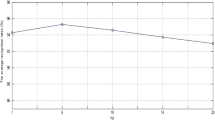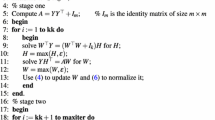Abstract
A novel Discriminant Non-negative Matrix Factorization (DNMF) method that uses projected gradients, is presented in this paper. The proposed algorithm guarantees the algorithm’s convergence to a stationary point, contrary to the methods introduced so far, that only ensure the non-increasing behavior of the algorithm’s cost function. The proposed algorithm employs some extra modifications that make the method more suitable for classification tasks. The usefulness of the proposed technique to the frontal face verification problem is also demonstrated.
Preview
Unable to display preview. Download preview PDF.
Similar content being viewed by others
References
Zafeiriou, S., Tefas, A., Buciu, I., Pitas, I.: Exploiting Discriminant Information in Nonnegative Matrix Factorization With Application to Frontal Face Verification. IEEE Transactions on Neural Networks 17(3), 683–695 (2006)
Lee, D.D., Seung, H.S.: Algorithms for Non-negative Matrix Factorization. In: NIPS 2000, pp. 556–562 (2000)
Lin, C.-J.: Projected gradient methods for non-negative matrix factorization. Technical report, Department of Computer Science, National Taiwan University (2005)
Buciu, I., Nikolaidis, N., Pitas, I.: On the initialization of the DNMF algorithm. In: Proc. of 2006 IEEE International Symposium on Circuits and Systems, Kos, Greece (2006)
Lin, C.-J., More, J.J.: Newton’s method for large-scale bound constrained problems. SIAM Journal on Optimization 9, 1100–1127 (1999)
Lee, D.D., Seung, H.S.: Learning the parts of objects by non-negative matrix factorization. Nature 401, 788–791 (1999)
Buciu, I., Pitas, I.: Application of non-negative and local non negative matrix factorization to facial expression recognition. In: ICPR 2004, Cambridge, United Kingdom, pp. 288–291 (2004)
Messer, K., Matas, J., Kittler, J.V., Luettin, J., Maitre, G.: XM2VTSDB: The Extended M2VTS Database. In: AVBPA 1999, Washington, DC, USA, pp. 72–77 (1999)
Li, S.Z., Hou, X.W., Zhang, H.J.: Learning Spatially Localized, Parts-Based Representation. In: CVPR 2001, Kauai, HI, USA (2001)
Turk, M., Pentland, A.P.: Eigenfaces for Recognition. Journal of Cognitive Neuroscience 3, 71–86 (1991)
Belhumeur, P.N., Hespanha, J.P., Kriegman, D.J.: Eigenfaces vs. Fisherfaces: Recognition Using Class Specific Linear Projection. IEEE Transactions on Pattern Analysis and Machine Intelligence 19(7), 711–720 (1997)
Author information
Authors and Affiliations
Editor information
Editors and Affiliations
Copyright information
© 2008 Springer-Verlag Berlin Heidelberg
About this paper
Cite this paper
Kotsia, I., Zafeiriou, S., Pitas, I. (2008). Discriminant Non-negative Matrix Factorization and Projected Gradients for Frontal Face Verification. In: Schouten, B., Juul, N.C., Drygajlo, A., Tistarelli, M. (eds) Biometrics and Identity Management. BioID 2008. Lecture Notes in Computer Science, vol 5372. Springer, Berlin, Heidelberg. https://doi.org/10.1007/978-3-540-89991-4_9
Download citation
DOI: https://doi.org/10.1007/978-3-540-89991-4_9
Publisher Name: Springer, Berlin, Heidelberg
Print ISBN: 978-3-540-89990-7
Online ISBN: 978-3-540-89991-4
eBook Packages: Computer ScienceComputer Science (R0)




